| 21 February |
• yesterday • tomorrow |
| Optional Memorial of Saint Peter Damian |
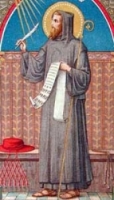
Petrus Damiani
Youngest child in a large but impoverished family of local nobility. Orphaned young, Peter was sent to live with a brother who mistreated him and forced him to work as a swine-herd. A pious boy, Peter was eventually sent to live with another brother, Damian, a priest in Ravenna, Italy; Peter was so grateful that he took the name Damian. Well educated in Ravenna, in Faenza and in Parma Italy. Professor. He was known for his life of strict austerity.
Around 1035, Peter gave up teaching to retire from the world and become a Benedictine monk. His health suffered, especially when he tried to replace sleep with prayer. He was forced to spend time in recovery; he used it to study Scripture, and when he was healthy, he was assigned to teach his brother monks and then the public. Economus of Fonte-Avellana; prior of the house in 1043, a post in which he served for the rest of his life. He expanded the monastery, greatly improved its library, and founded sister hermitages in San Severino, Gamugno, Acerata, Murciana, San Salvatore, Sitria, and Ocri. Friend of the future Pope Saint Gregory VII.
Attended a synod in Rome in 1047, and encouraged Pope Gregory VI to support a revitalization of Church zeal and clerical discipline. Wrote Liber Gomorrhianus, which described the vices of priests, mainly in their concern with worldly matters, with money, and the evil of simony. Created cardinal-bishop of Ostia on 30 November 1057. Fought simony. Tried to restore primitive discipline among priests and religious who were becoming more and more worldly. Strongly opposed anti-pope Benedict X. Legate to Milan for Pope Nicholas II in 1059; worked there with Saint Ariald the Deacon and Saint Anselm of Lucca. Supported Pope Alexander II.
A prolific correspondent, he also wrote dozens of sermons, seven biographies (including a one of Saint Romuald), and poetry, including some of the best Latin of the time. He tried to retire to live as a simple monk, but was routinely recalled as papal legate, called upon to make peace between arguing monastic houses, clergymen, and government officials, etc. Declared a Doctor of the Church in 1828.
1007 at Ravenna, Italy
• 22 February 1072 of fever at Ravenna, Italy while surrounded by brother monks reciting the Divine Office
• immediately buried in the in the monastery church; there were concerns that others would try to obtain his relics
• cultus developed almost immediately after his death
• relics moved several times, and since 1898 has been in the Chapel of Saint Peter Damian in the catherdral of Faenza, Italy
1823 by Pope Leo XII (cultus confirmation)
Faenza, Italy
• cardinal bearing a whip in his hand
• pilgrim holding a papal bull, to signify his many legations
Let us faithfully transmit to posterity the example of virtue which we have received from our forefathers. - Saint Peter Damian
https://catholicsaints.info/saint-peter-damian/
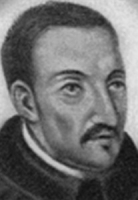
• 25 October as one of the Forty Martyrs of England and Wales
• 29 October as one of the Martyrs of Douai
Raised in a piously Catholic family. Educated at Douai and at Paris, France. Joined the Jesuits in 1580. Prefect of studies in the English College at Rome, Italy. Ordained in 1584. Returned to England in 1586 to minister to covert Catholics, working with Henry Garnett. Chaplain to Ann Howard, wife of Saint Philip Howard, in 1589. Wrote a number of pamphlets on living a pious life. Arrested in 1595 for the crime of being a priest. Repeatedly tortured in hopes of learning the location of other priests. He was so badly treated in prison that his family petitioned for a quick trial, knowing that his certain death would be better than the conditions in which he was housed. He spent three years imprisoned in the Tower of London, and was tortured on the rack ten times; between abuses he studied the Bible and wrote poetry. He was finally tried and convicted for treason, having admitted that he administered the Sacraments. Martyr.
1561 in Horsham Saint Faith, Norfolk, England
• hanged, drawn and quartered on 21 February 1595 in Tyburn, London, England
• while hanging, he repeatedly made the sign of the cross
• onlookers tugged at his legs to help him die quicker
25 October 1970 by Pope Paul VI
• A Short Rule of Good Life
• Epistle of Comfort
• Humble Supplication to Queen Elizabeth
• Mary Magdalen's Tears
• The Burning Babe
• Triumphs over Death
Till twelve years' age, how Christ His childhood spent
All earthly pens unworthy were to write;
Such acts to mortal eyes He did present,
Whose worth not men but angels must recite:
No nature's blots, no childish faults defiled,
Where grace was guide, and God did play the child.
In springing locks lay crouched hoary wit,
In semblant young, a grave and ancient port;
In lowly looks high majesty did sit,
In tender tongue sound sense of sagest sort:
Nature imparted all that she could teach,
And God supplied where nature could not reach.
His mirth of modest mien a mirror was;
His sadness temper'd with a mild aspect;
His eye to try each action was a glass,
Whose looks did good approve and bad correct;
His nature's gifts, His grace, His word and deed,
Well show'd that all did from a God proceed.
- "Christ's Childhood", by Saint Robert Southwell
https://catholicsaints.info/saint-robert-southwell/

Natalis, Natale
Ordained in 1771, he served for several years as assistant pastor at different parishes. Parish priest at Saint Aubin, Louroux-Beconnais, France in 1788, with a special ministry with the sick.
In the French Revolution, he was required to take an oath of loyalty to the new government, an oath that was opposed to Church principles. Noel refused, and was ordered to abandon his parish, to come no closer to it than eight miles for at least two years. He left, then returned in secret, and ministered clandestinely to his flock. Some of his brother priests took the civil oath, but Noel convinced several of them to renouce it, and return their loyalty to the Church.
In 1793, a counter-revolution began in western France; when these forces won some victories, Pinot returned to openly ministering to his flock. However, the forces of the Revolution began to win again, and Pinot became a wanted man. Captured by government soldiers while preparing for Mass, he was imprisoned for twelve days; sentenced to death for refusing to take the oath, and encouraging others to do so.
19 December 1747 at Angers, Maine-et-Loire, France
• guillotined on 21 February 1794 at Angers, Maine-et-Loire, France
• he wore his Mass vestments to execution, and died reciting the opening words of the Mass
21 October 1926 by Pope Pius XI
https://catholicsaints.info/blessed-noel-pinot/
Thomas Whitgift
• 22 November as one of the Martyrs of England, Scotland, and Wales
• 29 October as one of the Martyrs of Douai
Educated at Cambridge University. Studied at the seminary in Rheims, France in 1581, and then, beginning in 1582, in Rome, Italy. Ordained in 1587. Worked with Bishop Owen Lewis in the diocese of Cassano, Italy. Prefect of studies at the Swiss college in Milan, Italy on 25 April 1590. He returned to England, travelling under the name Whitgift, and was arrested on 25 July 1591 in London for the crime of being a priest, but he escaped. Arrested again a couple of months later, he was imprisoned, racked and tortured for months. Convicted on 8 February 1592 of the crime of treason for being a priest and conferring reconciliation to an Englishman. Martyr.
c.1560 in Little Limber, Lincolnshire, England
hanged on 20 February 1592 at Saint Paul's Churchyard, London, England on a gibbet erected next to the shop of the man who's confession he was accused of hearing
22 November 1987 by Pope John Paul II
https://catholicsaints.info/blessed-thomas-pormort/
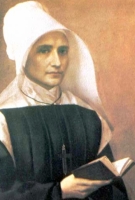
• Anna Caterina
• Maria Enrichetta
• Maria Henrich Dominici
• Mother Maria Enrica Dominici
Member of the Sisters of Saint Anne for 44 years, entering in November 1850 and taking the name Sister Mary Henrietta. Worked tirelessly with cholera people during and outbreak in 1854. Novice mistress for several years. Served 33 years as Superior General of her congregation. Friend and advisor to Saint John Bosco.
10 October 1829 in Borgo Salsasio, Carmagnola, Turin, Italy
21 February 1894 in Turin, Italy of natural causes
7 May 1978 by Pope Paul VI
https://catholicsaints.info/blessed-caterina-dominici/
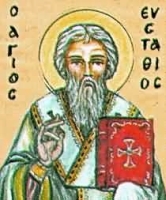
• Eustathius the Great
• Eustacius, Eustatius, Eustace, Eustazio
Noted for his learning and personal piety, and his eloquence in the defense of Christianity. Bishop of Beroea, Syria. Bishop of Antioch (modern Antakya, Turkey) c.324. Fought Arianism. Assisted at the General Council of Nice. Exiled by Emperor Constantine the Great for his opposition to Arianism. His De Engastrimytho contra Origenem, an essay on the Witch of Endor, has survived.
c.270 at Sida, Pamphylia (in modern Turkey)
• c.337 at Philippi, Macedonia of natural causes
• relics transferred to Antioch in 482
https://catholicsaints.info/saint-eustathius-of-antioch/
A group of 26 Christians martyred together by Vandals. We know little more than eight of their names - Alexander, Felix, Fortunatus, Saturninus, Secundinus, Servulus, Siricius and Verulus.
c.434 at Hadrumetum (modern Sousse, Tunisia)
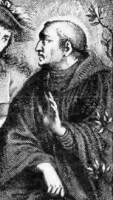
German
Born to a wealthy senatorial family; educated by Saint Modoald of Trier. Spiritual student of Saint Arnulf of Metz. Monk of Münster-Granfel Abbey. Monk of Remiremont Abbey. Monk of Luxeuil Abbey. Spiritual student of Saint Waldebert. Priest. Abbot of Granfield Abbey, Val Moutier, Switzerland where he worked with Saint Randoald. Martyred for interceding with local authorities on behalf of the poor.
Trier, Germany
c.677
https://catholicsaints.info/saint-germanus-of-granfield/
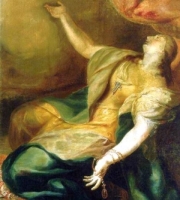
Eleonora
Daughter of Count Raymond IV of Provence. Married King Henry III of England on 14 January 1236 at the age of ten. Queen of England. Widowed in 1273 after 37 years of marriage. Benedictine nun abbey of Amesbury, England on 3 July 1276. Known throughout her life as a pious and prayerful woman.
1222 in Provence, France
25 June 1291 at the Benedictine abbey of Amesbury, England of natural causes
no formal beatification; popular devotion began at her death and continues
https://catholicsaints.info/blessed-eleanora/
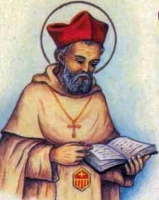
Mercedarian friar. Commander of the house of Carcassonne, France. In 1318 he went on the road as a pilgrim to collect alms to ransom Christians held in slavery in Muslim controlled territories. His pilgrim's staff had a flag with the image of Our Lady of Mercy, a slave kneeling at her feet, and the words "Haec est coeli door" ("this is heaven’s door"). He travelled to north Africa in 1330 to redeem those Christians. Cardinal of Santa Pudenziana. Miracle worker.
France
https://catholicsaints.info/blessed-claudio-di-portaceli/
• Valerius of Astorga
• Valerius del Bierzo
• Valerius Berdigensis
• Valerio...
Born to the nobility of Visigothic Spain, Valerius was early drawn to religious life, and became a Benedictine monk. He retired for a while to live as a desert hermit, then returned to monastic life. Abbot of the monastery San Pedro de Montes in Galicia, Spain. He left several ascetic writings.
7th-century Astorga, Spain
695
https://catholicsaints.info/saint-valerius-of-san-pedro-de-montes/
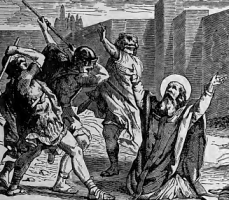
Severianus, Severinus
Bishop of Scythopolis (in modern north-east Israel). Murdered by a band of soldiers led by a heretical Eutychian monk. Martyr.
452 or 453 (records vary)
https://catholicsaints.info/saint-severian-of-scythopolis/

• Pepin the Elder
• Pepin I
• Pippin, Pipino
Duke of Brabant. Married to Saint Ida of Nivelles. Father of Saint Gertrude of Nivelles and Saint Begga of Ardenne. Described as "a lover of peace and the constant defender of truth and justice".
575
c.646 at Landen, Brabant, Belgium of natural causes
https://catholicsaints.info/saint-pepin-of-landen/
Three Japanese laymen, all brothers, all sons of Paulus Uchibori Sakuemon, one a teenager, one only five years old, and all martyred for their faith in the persecutions in Japan. We know little more about them but the names Antonius, Balthasar and Ignatius.
21 February 1627 in Shimabara, Nagasaki, Japan
24 November 2008 by Pope Benedict XVI
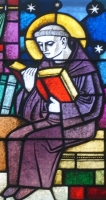
Rancald, Randaut
Monk. Prior of Granfield Abbey, Val Moutier, Switzerland. Martyred for interceding with local authorities on behalf of the poor.
c.677 in the canton of Bern, Switzerland
https://catholicsaints.info/saint-randoald-of-granfield/
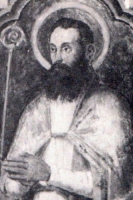
Monk. Friend and spiritual student of Pope Saint Gregory the Great. Bishop of Brescia, Italy. Prolific writer.
606
https://catholicsaints.info/saint-paterius-of-brescia/
Peter the Scribe
Martyred by Muslims for supporting Christianity and denigrating Islam.
c.737 in Damascus (in modern Syria)
Whoever does not embrace the Christian and Catholic faith is lost, like your false prophet Mahomet. – Saint Peter
https://catholicsaints.info/saint-peter-mavimenus/
Gondelbert, Gumbert, Gumbertus, Gundelbert, Gundelbertus
Bishop of Sens, France. Around 660 he retired from the office, lived as a hermit in the Vosges region of France, and founded the Benedictine monastery of Saint Peter in Senones.
c.676
https://catholicsaints.info/saint-gundebert-of-sens/
Mountain hermit in the Osroena region (in modern Turkey) who lived such an ascetic lifestyle that he didn’t even bother with shelter, and spent his time in prayer outdoors, winter and summer, in the mid 5th century. He was known as a miracle worker, his prayers healing many.
https://catholicsaints.info/saint-james-of-osroena/
Hermit on Mount Sirik; monk at Bonyssa; bishop of Amastris (modern Amasra, Turkey). Successfully defended Amastris city during Saracen attacks.
at Kromna near Amastris on the Black Sea
c.825 of natural causes
https://catholicsaints.info/saint-george-of-amastris/
Ercongota, Ercongote
Born a princess, the daughter of King Erconbert of Kent (part of modern England) and Saint Saxburgh of Ely. Nun at Faremoutiers-en-Brie where her aunt, Saint Ethelburgh, was abbess.
660
https://catholicsaints.info/saint-ercongotha/
Martyred in the persecutions of Diocletian. The monastery of San Massimo di Lucusiano in Palermo, founded by Pope Gregory the Great was apparently named in his honour.
303 in Palermo, Italy
https://catholicsaints.info/saint-massimus-of-palermo/
The only one of a group of 62 martyrs whose name has come down to us.
mid-3rd century in Syrmium, Pannonia (modern Sremska Mitrovica, Serbia)
https://catholicsaints.info/saint-severus-of-syrmium/
Bishop of Clermont, Auvergne, France from 676 until his death.
689
https://catholicsaints.info/saint-avitus-ii-of-clermont/
Felice
Third bishop of Metz, France; served for over 40 years in the 2nd century.
https://catholicsaints.info/saint-felix-of-metz/
Martyred in the persecutions of Diocletian.
303 in Palermo, Italy
https://catholicsaints.info/saint-claudius-of-palermo/
Martyred in the persecutions of Diocletian.
303 in Palermo, Italy
https://catholicsaints.info/saint-sabinus-of-palermo/
Seventy-nine Christians martyred together in the persecutions of Diocletian.
c.303 on Sicily
https://catholicsaints.info/martyrs-of-sicily/
Persian Christian martyred in the persecutions of King Shapur II.
344
https://catholicsaints.info/saint-daniel-of-persia/
Persian Christian martyred in the persecutions of King Shapur II.
344
https://catholicsaints.info/saint-verda-of-persia/
CatholicSaints.Info Portable Edition